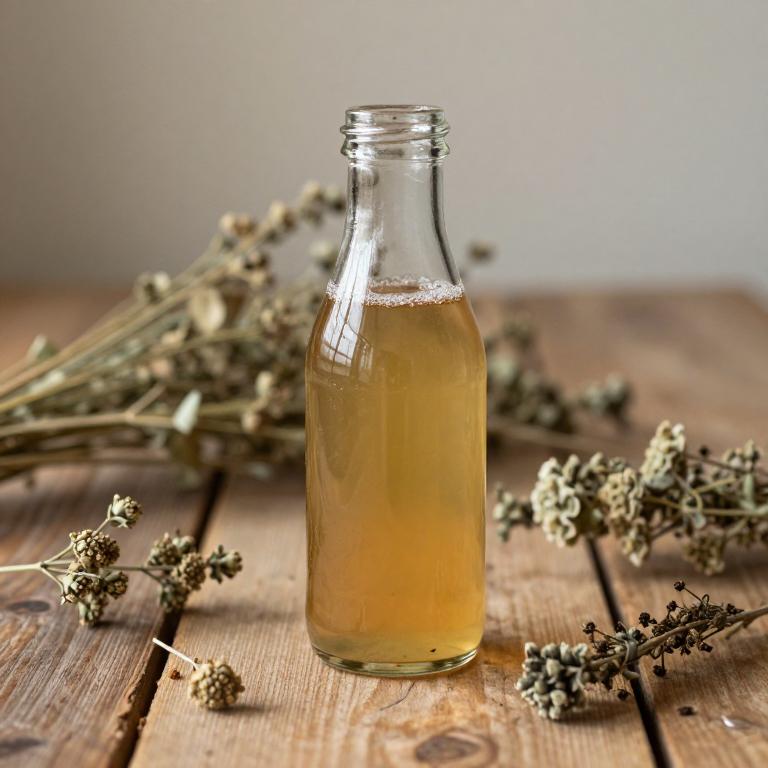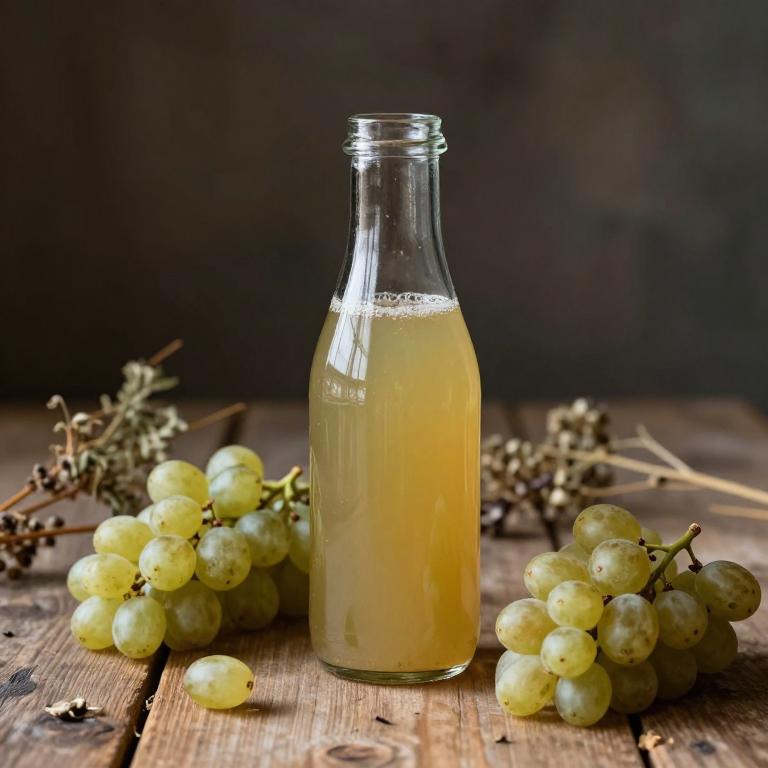10 Best Herbal Juices For Joint Pain

Herbal juices have gained popularity as natural remedies for joint pain, offering a gentler alternative to pharmaceutical treatments.
Ingredients like turmeric, ginger, and celery are commonly used in these juices due to their anti-inflammatory and pain-relieving properties. Turmeric contains curcumin, which has been shown to reduce inflammation and improve joint mobility. Ginger helps alleviate pain and reduce swelling, making it a valuable addition to joint health regimens.
When consumed regularly, these herbal juices may support overall joint function and provide long-term relief for individuals suffering from conditions like arthritis.
Table of Contents
- 1. Turmeric (Curcuma longa)
- 2. Ginger (Zingiber officinale)
- 3. Salvia (Salvia officinalis)
- 4. Field horsetail (Equisetum arvense)
- 5. Common grape (Vitis vinifera)
- 6. Licorice (Glycyrrhiza glabra)
- 7. Dog rose (Rosa canina)
- 8. Yarrow (Achillea millefolium)
- 9. Thistle (Silybum marianum)
- 10. Stinging nettle (Urtica dioica)
1. Turmeric (Curcuma longa)

Curcuma longa, commonly known as turmeric, contains a bioactive compound called curcumin, which is widely recognized for its anti-inflammatory and antioxidant properties.
When consumed as a herbal juice, curcuma longa may help reduce inflammation and pain associated with joint conditions such as arthritis. To enhance absorption, it is often combined with black pepper or healthy fats like coconut oil in the juice formulation. Regular consumption of turmeric juice may support joint health by improving mobility and reducing stiffness.
However, it is advisable to consult a healthcare professional before incorporating turmeric juice into a treatment plan for joint pain.
2. Ginger (Zingiber officinale)

Zingiber officinale, commonly known as ginger, has been traditionally used for its anti-inflammatory and analgesic properties, making it a popular ingredient in herbal juices for alleviating joint pain.
The active compounds in ginger, such as gingerol and shogaol, are believed to help reduce inflammation and oxidative stress, which are often associated with conditions like arthritis. When consumed as a juice, ginger can be combined with other beneficial ingredients like turmeric, lemon, and honey to enhance its therapeutic effects. Regular consumption of ginger-based herbal juices may provide natural relief for individuals suffering from chronic joint discomfort.
However, it is advisable to consult a healthcare professional before incorporating such remedies into a treatment plan, especially for those with existing medical conditions or on medication.
3. Salvia (Salvia officinalis)

Salvia officinalis, commonly known as sage, has been traditionally used for its medicinal properties, including its potential benefits for joint pain.
While sage is more commonly associated with culinary use, some herbal preparations derived from it may offer anti-inflammatory and analgesic effects that could help alleviate joint discomfort. Research suggests that compounds like rosmarinic acid and flavonoids present in sage may reduce inflammation and oxidative stress, which are often linked to conditions like arthritis. However, it is important to note that scientific evidence supporting the efficacy of sage-based herbal juices for joint pain is limited and more studies are needed.
As with any herbal remedy, it is advisable to consult a healthcare professional before incorporating sage juice into a treatment plan for joint pain.
4. Field horsetail (Equisetum arvense)

Equisetum arvense, commonly known as field horsetail, is a plant traditionally used in herbal medicine for its potential benefits in alleviating joint pain.
The plant is rich in silica, which is believed to support the health of connective tissues and may help reduce inflammation in joints. Herbal juices made from Equisetum arvense are often prepared by soaking the dried plant in water or vinegar to extract its active compounds. These juices are typically consumed internally to promote joint flexibility and reduce discomfort associated with conditions like arthritis.
However, it is important to consult a healthcare professional before using Equisetum arvense, as it may interact with certain medications and is not suitable for everyone.
5. Common grape (Vitis vinifera)

Vitis vinifera, commonly known as the grape vine, has been traditionally used in herbal medicine for its potential anti-inflammatory and antioxidant properties.
Herbal juices derived from Vitis vinifera, such as grape juice or extracts from its leaves and berries, are believed to support joint health by reducing inflammation and oxidative stress. These juices contain polyphenols, resveratrol, and other bioactive compounds that may help alleviate symptoms of joint pain and arthritis. Some studies suggest that regular consumption of Vitis vinifera-based juices could enhance mobility and reduce discomfort in individuals with joint-related conditions.
However, while preliminary research is promising, more clinical trials are needed to fully establish the efficacy and safety of these herbal juices for joint pain relief.
6. Licorice (Glycyrrhiza glabra)

Glycyrrhiza glabra, commonly known as licorice root, has been traditionally used in herbal medicine for its anti-inflammatory and analgesic properties.
When processed into herbal juices, glycyrrhiza glabra may help alleviate joint pain by reducing inflammation and supporting the body's natural healing processes. The active compounds in licorice root, such as glycyrrhizin and flavonoids, are believed to contribute to its soothing effects on the joints. However, excessive consumption of licorice root juice can lead to side effects like increased blood pressure due to its mineralocorticoid-like activity.
As a result, it is advisable to consult a healthcare professional before using licorice root juice for joint pain, especially for individuals with pre-existing health conditions.
7. Dog rose (Rosa canina)

Rosa canina, commonly known as rosehip, is a traditional herbal remedy that has been used for centuries to support joint health and alleviate joint pain.
The seeds and fruits of the Rosa canina plant are rich in bioactive compounds such as omega-3 fatty acids, antioxidants, and vitamin C, which contribute to its anti-inflammatory and pain-relieving properties. Rosa canina herbal juices are often consumed as a natural alternative to conventional pain medications, offering a gentler approach with fewer side effects. These juices may help reduce inflammation, improve joint mobility, and support the overall health of connective tissues.
Due to their high nutrient content, rosa canina juices are increasingly popular in holistic and complementary medicine for managing conditions like arthritis and joint discomfort.
8. Yarrow (Achillea millefolium)

Achillea millefolium, commonly known as yarrow, has been traditionally used for its medicinal properties, including its potential benefits for joint pain.
Herbal juices made from fresh or dried yarrow leaves and flowers may contain compounds that have anti-inflammatory and analgesic effects, which could help reduce discomfort associated with conditions like arthritis. These juices are often prepared by combining yarrow with other herbs such as turmeric or ginger to enhance their therapeutic properties. While some studies suggest that yarrow may support joint health, more research is needed to fully understand its efficacy and safety.
As with any herbal remedy, it is advisable to consult a healthcare professional before incorporating yarrow juice into a treatment regimen for joint pain.
9. Thistle (Silybum marianum)

Silybum marianum, also known as milk thistle, is a herbal plant commonly used for its potential health benefits, including support for joint pain.
While traditionally known for its liver-protective properties, recent studies suggest that the active compound silymarin may also have anti-inflammatory effects that could help alleviate joint discomfort. Herbal juices made from Silybum marianum are often consumed to promote overall joint health and reduce inflammation associated with conditions like arthritis. These juices are typically made by infusing the seeds or leaves in water or a base like apple juice, enhancing their bioavailability.
However, it's important to consult with a healthcare professional before incorporating these juices into a treatment plan for joint pain, as they may interact with other medications or have side effects.
10. Stinging nettle (Urtica dioica)

Urtica dioica, commonly known as stinging nettle, has been traditionally used for its potential health benefits, including relief from joint pain.
When processed into a herbal juice, it is believed to provide anti-inflammatory properties that may help reduce swelling and discomfort in joints. The juice is typically prepared by juicing fresh leaves, which are rich in minerals, antioxidants, and compounds that support joint health. Some studies suggest that the bioactive components in stinging nettle juice can inhibit inflammatory pathways in the body.
However, it is important to consult a healthcare professional before using it, especially if you have existing medical conditions or are taking medications.